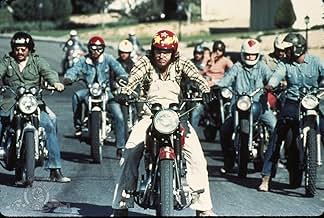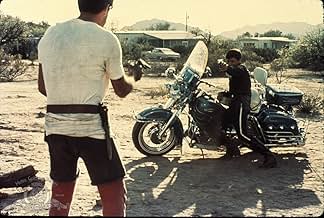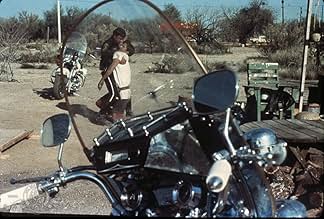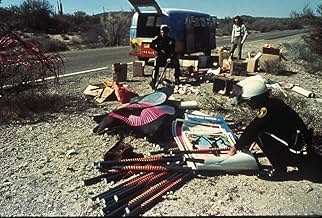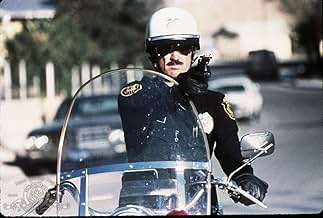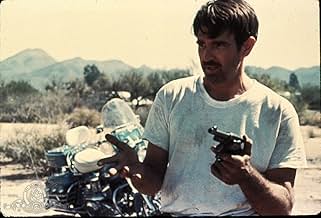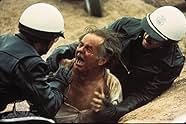VALUTAZIONE IMDb
7,0/10
6849
LA TUA VALUTAZIONE
Aggiungi una trama nella tua linguaA motorcycle cop with a Harley-Davidson ties hippies to a murder in the Arizona desert.A motorcycle cop with a Harley-Davidson ties hippies to a murder in the Arizona desert.A motorcycle cop with a Harley-Davidson ties hippies to a murder in the Arizona desert.
- Regia
- Sceneggiatura
- Star
- Premi
- 3 candidature totali
Billy Green Bush
- Zipper
- (as Billy 'Green' Bush)
Elisha Cook Jr.
- Willie
- (as Elisha Cook)
Hawk Wolinski
- VW Bus Driver
- (as David J. Wolinski)
Melissa Greene
- Zemko's Girlfriend
- (as Melissa Green)
Recensioni in evidenza
An incredible piece of film making, this beautifully shot movie really is about as poetic as it's possible for cinema to be and still have a coherent, gripping narrative. It feels like a western with its dramatic monument valley backdrop and masculine themes, but plays more like a European movie, with it's dark characterisations and existential mood . The soundtrack is fantastic and the feeling the movie imparts is unique. I always recommend this film to people because so few have ever seen it. I think it's a tragedy that James Guercio didn't make more movies because this was his first (and only) film and it's up there with the best of Peckinpah/Leone/Boorman/Seigal (whose work is similar). I'll never forget this film and the ending will live with me forever. If you like movies you need to see this film, This is real Cinema.
Blake, as Big John Wintergreen, is the idealized American who is a Marine Corps veteran from Vietnam, comes back and wants to do the right thing: enforce the law fairly and not give favors to other cops nor hassle the hippies. He is "chopping the wood before him" by riding his Harley, working traffic and the concert and hoping to be a Detective. He tries hard and provides info to the lead Detective but he just can't bring himself to be brutal to the hippies at the commune or hassle the hippie VW Bus drivers. And he is a man, and hence tempted by the delightful Jolene. His traffic partner, Zipper, wants more but doesn't want to work for it like Wintergreen. And amidst all these human dynamics is a murder and theft of cash. Aside from being a great story, there are many specifics that will make you want to watch this film. The 70's flavor is a fun retrospective. The Police Bike vs. dirt bike chase scene is the greatest ever done. The desert scenery never looked better and the Monument Valley morning scene is a real treat. The soundtrack is perhaps the biggest star. You have Du-Wop, Country, Rock and jazz. Sadly, only parts of some songs are in the movie (or are spoken over) and the soundtrack is not available on CD. If you are ever in an old record store, look for the LP in a silver colored cover. You may even be lucky enough to get the posters and picture book that came with the album. I would love to see Rhino records give this soundtrack the same treatment they gave to Casablanca. You will like John Wintergreen and feel his joys and sorrows as his personal and professional life take their ups and downs.
Before he found himself on the wrong side of a murder investigation, Blake was noted for playing an unconventional cop on the TV show "Baretta" (and also the flip side as a brutal killer in the film "In Cold Blood".) Here he is a square peg trying to fit into a round hole as a California Highway Patrolman with dreams of more. At 5'4", he is a full head shorter than the shortest of his fellow motorcycle-riding fellow officers. Though his cohort Bush balances his days between sitting on his bike reading comic books and listening to the radio with pulling over anyone even remotely suspicious, Blake yearns to be a better cop than that and, ultimately, a detective. When (after a thoroughly gripping opening sequence) a man is found shot to death, Blake seizes the opportunity to piece the situation together and becomes the driver and right hand man to hotshot detective Ryan. As the pair attempts to solve the mystery of the man's death, their faults, attributes and insecurities are laid bare (notably in an extended scene with Riley, a barmaid who has known both men for a long time.) Finally, the truth of the death comes to light, but only after significant turmoil, carnage and some surprises. Blake is terrific in the lead. He perfectly captures the awkwardness mixed with ambition of his character. He has many memorable scenes, more than a few of which that poke fun at his size (though he was in great physical shape at the time.) Bush lends strong support as his rather amoral buddy. Ryan is splendidly authoritarian and paints a memorable portrait of a man who is a big shot (especially in his own mind) every time and everywhere except when it counts. He is perfect in the role. Cook has a very showy and effective role as a mentally challenged old man who discovers the body. Riley is effective in her sleazy, but sympathetic role, but her big scene does seem out of place somehow and shifts the focus of the movie more than it probably ought to. Dano, a strong character actor in countless TV and film projects, does an excellent job as a jaded coroner (a far cry from "Quincy M.D.", he not only eschews a surgical mask, but smokes a cigarette during the autopsy!) The film is gorgeously photographed and extremely creatively directed. It had to be way ahead of its time in terms of camera-work. The texture and atmosphere of the scenes is beyond most of what is cranked out today. It's also loaded with quirkiness and irony (some might say overloaded.) In any case, it's a unique viewing experience with many rewards for the patient and incisive viewer. There's also a motorcycle chase that rivals any of the best from this period. Like so many films, the only way it can be fully appreciated is in the widescreen format. The glimpses of Monument Valley are welcome and add much to the visual appeal of the film. The film isn't completely flawless, but it is highly memorable. The title refers to the make and color of a motorcycle.
Robert Blake has one of the best roles of his career as John Wintergreen, a dedicated motorcycle cop who yearns for more in life. What he'd really like is to be a detective - to wear a suit, a Stetson, and "get paid to think". He gets his chance when he discovers what first appears to be a suicide, but which John determines had to have been a murder. When John shows that he's got what it takes for the detective business, a charismatic hotshot named Harve Poole (Mitch Ryan) takes him under his wing, hiring John as a driver. What happens is that John becomes quite disillusioned watching Harve at work. John strives to be a good, kind, honest man, and doesn't like Harves' approach to law enforcement. A revelation regarding his colleague and good friend "Zipper" (Billy Green Bush) only adds to his dismay.
"Electra Glide in Blue" marked the filmmaking debut for James William Guercio, a veteran of the music industry who, with the help of ace cinematographer Conrad Hall, brings a lot of visual poetry which is not the action-packed murder mystery that some viewers might expect, or hope, it to be. That aspect of this film is never heavily stressed, as the movie clearly functions much more as a series of character vignettes. It's got a very deliberate pace to it, as it gives a number of its major players opportunities to tear into some meaty roles. Blake and Bush have fine chemistry and are quite engaging; you believe them as buddies. Ryan commands the screen whenever he's around; he's an excellent character actor (whom you may know best as the villain in "Lethal Weapon") who gives his role some real nuance. Royal Dano is a little under utilized as a grumpy coroner with whom John butts heads, but Jeannine Riley is wonderful as the barmaid Jolene, and Elisha Cook Jr. is as delightful as ever in the role of sad old sack Willie. Considering Guercios' background, it's not a surprise that some of the supporting players come from the music business - screenwriter Hawk Wolinski as the van driving hippie, and Peter Cetera and Terry Kath from the band Chicago; Cetera, amusingly, plays a scruffy biker. Keep a sharp eye out for Nick Nolte, uncredited as an extra in the commune scene.
The film turns out to be a moving meditation on personal ideals and loneliness, and leads to a shattering conclusion. This conclusion is much in line with films of this time period, and takes its time to play out. It's the kind of thing you don't easily forget.
It's not hard to see why this would have a following. It's interesting and it's entertaining, and well worth a look.
Seven out of 10.
"Electra Glide in Blue" marked the filmmaking debut for James William Guercio, a veteran of the music industry who, with the help of ace cinematographer Conrad Hall, brings a lot of visual poetry which is not the action-packed murder mystery that some viewers might expect, or hope, it to be. That aspect of this film is never heavily stressed, as the movie clearly functions much more as a series of character vignettes. It's got a very deliberate pace to it, as it gives a number of its major players opportunities to tear into some meaty roles. Blake and Bush have fine chemistry and are quite engaging; you believe them as buddies. Ryan commands the screen whenever he's around; he's an excellent character actor (whom you may know best as the villain in "Lethal Weapon") who gives his role some real nuance. Royal Dano is a little under utilized as a grumpy coroner with whom John butts heads, but Jeannine Riley is wonderful as the barmaid Jolene, and Elisha Cook Jr. is as delightful as ever in the role of sad old sack Willie. Considering Guercios' background, it's not a surprise that some of the supporting players come from the music business - screenwriter Hawk Wolinski as the van driving hippie, and Peter Cetera and Terry Kath from the band Chicago; Cetera, amusingly, plays a scruffy biker. Keep a sharp eye out for Nick Nolte, uncredited as an extra in the commune scene.
The film turns out to be a moving meditation on personal ideals and loneliness, and leads to a shattering conclusion. This conclusion is much in line with films of this time period, and takes its time to play out. It's the kind of thing you don't easily forget.
It's not hard to see why this would have a following. It's interesting and it's entertaining, and well worth a look.
Seven out of 10.
With those evocative images and that emotionally charged music, the final fifteen minutes are electrifying. It's all about America, and a terrible ten years of assassinations, Viet Nam, and countless other cultural strife. The film's ending is saying ... enough is enough. Let the healing begin. And as American culture bled in the late 1960s and early 1970s, so too did the emotional lives of individuals, like the hodgepodge of aggrieved characters that come and go in this story.
Seeing some of these people and listening to their individual stories of pain and suffering is John Wintergreen (Robert Blake), a by-the-book Arizona motorcycle cop, short on stature but tall on dreams. Sometimes with his partner Zipper (Billy Green Bush), "Big John" encounters these tormented souls, on the road mostly. That's his job. The film's story is an ode to the courage and nobility of ordinary Americans pained by reality with only their dreams to comfort them.
The film's disjointed plot begins with a killing. And this incident keeps the plot moving. But "Electra Glide In Blue" is mostly a character study, not a crime film. Color cinematography is quite good. Interior shots have lots of close-ups, even extreme close-ups. There's a lot of diffuse lighting. Exteriors are shot like a modern-day Western. Indeed, the look and feel of the film is similar in some ways to the old John Ford Westerns, like "The Searchers".
The plot is the main weakness of the film. Some parts are overplayed, like the chase scenes. There's a lack of continuity both in storyline and in visual elements. It's as if many scenes were shot impromptu, on the rush. And some of the acting is way over the top. However, Robert Blake does a fine job as America's everyday cop with his sense of principles.
This film reminds me in some ways of "Zabriskie Point" (1970), a counter culture film which has a powerful ending that helps to make up for earlier plot problems.
Based on a real-life event, "Electra Glide In Blue" gets off to a slow start. Even midway through, one wonders whether this film is going anywhere or has any point to it. It is, and it does. You just have to wait for that powerful ending and its cinematic message of a tormented America, from the point of view of one lonely cop, just doing his job.
Seeing some of these people and listening to their individual stories of pain and suffering is John Wintergreen (Robert Blake), a by-the-book Arizona motorcycle cop, short on stature but tall on dreams. Sometimes with his partner Zipper (Billy Green Bush), "Big John" encounters these tormented souls, on the road mostly. That's his job. The film's story is an ode to the courage and nobility of ordinary Americans pained by reality with only their dreams to comfort them.
The film's disjointed plot begins with a killing. And this incident keeps the plot moving. But "Electra Glide In Blue" is mostly a character study, not a crime film. Color cinematography is quite good. Interior shots have lots of close-ups, even extreme close-ups. There's a lot of diffuse lighting. Exteriors are shot like a modern-day Western. Indeed, the look and feel of the film is similar in some ways to the old John Ford Westerns, like "The Searchers".
The plot is the main weakness of the film. Some parts are overplayed, like the chase scenes. There's a lack of continuity both in storyline and in visual elements. It's as if many scenes were shot impromptu, on the rush. And some of the acting is way over the top. However, Robert Blake does a fine job as America's everyday cop with his sense of principles.
This film reminds me in some ways of "Zabriskie Point" (1970), a counter culture film which has a powerful ending that helps to make up for earlier plot problems.
Based on a real-life event, "Electra Glide In Blue" gets off to a slow start. Even midway through, one wonders whether this film is going anywhere or has any point to it. It is, and it does. You just have to wait for that powerful ending and its cinematic message of a tormented America, from the point of view of one lonely cop, just doing his job.
Lo sapevi?
- QuizFirst-time director James William Guercio wanted Conrad L. Hall to photograph this film, but Hall's salary was more than was budgeted for a cinematographer. Guercio reduced his own salary to $1.00 so he could secure Hall as the cinematographer.
- BlooperIn the final driving scenes, the van and the bike, supposedly driving along a long straight road, drive by the same distant butte at least three times.
- Citazioni
Harve Poole: Incompetence is the worst form of corruption.
- Versioni alternativeJohn Wintergreen is called John Winterberg in the German version.
- ConnessioniEdited into The Our Gang Story (1994)
I più visti
Accedi per valutare e creare un elenco di titoli salvati per ottenere consigli personalizzati
- How long is Electra Glide in Blue?Powered by Alexa
Dettagli
Botteghino
- Lordo Stati Uniti e Canada
- 1.600.000 USD
- Tempo di esecuzione1 ora 54 minuti
- Colore
- Mix di suoni
- Proporzioni
- 2.39 : 1
Contribuisci a questa pagina
Suggerisci una modifica o aggiungi i contenuti mancanti

Divario superiore
By what name was Electra Glide (1973) officially released in India in English?
Rispondi

